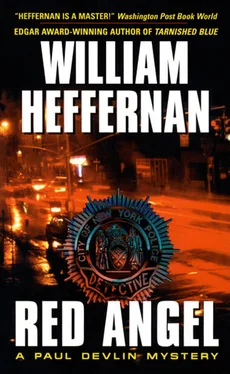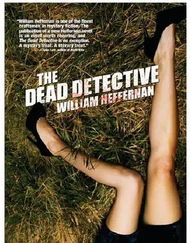William Heffernan - Red Angel
Здесь есть возможность читать онлайн «William Heffernan - Red Angel» весь текст электронной книги совершенно бесплатно (целиком полную версию без сокращений). В некоторых случаях можно слушать аудио, скачать через торрент в формате fb2 и присутствует краткое содержание. Жанр: Триллер, на английском языке. Описание произведения, (предисловие) а так же отзывы посетителей доступны на портале библиотеки ЛибКат.
- Название:Red Angel
- Автор:
- Жанр:
- Год:неизвестен
- ISBN:нет данных
- Рейтинг книги:4 / 5. Голосов: 1
-
Избранное:Добавить в избранное
- Отзывы:
-
Ваша оценка:
- 80
- 1
- 2
- 3
- 4
- 5
Red Angel: краткое содержание, описание и аннотация
Предлагаем к чтению аннотацию, описание, краткое содержание или предисловие (зависит от того, что написал сам автор книги «Red Angel»). Если вы не нашли необходимую информацию о книге — напишите в комментариях, мы постараемся отыскать её.
Red Angel — читать онлайн бесплатно полную книгу (весь текст) целиком
Ниже представлен текст книги, разбитый по страницам. Система сохранения места последней прочитанной страницы, позволяет с удобством читать онлайн бесплатно книгу «Red Angel», без необходимости каждый раз заново искать на чём Вы остановились. Поставьте закладку, и сможете в любой момент перейти на страницу, на которой закончили чтение.
Интервал:
Закладка:
“Tell me what’s wrong with your country,” Devlin said.
“Ah, many things,” Martinez answered. “First is repression, of course. We are not free to come and go as we would wish. Next is this dual economy that has been dropped on us like a stone. Today, we have a peso economy and a dollar economy. Two separate worlds.” He waved his arm in a large circle. “I can take you to dollar stores, where everything must be purchased in U.S. currency. They are magnificent stores that are the same as stores in your country. Then I can take you to peso stores, where Cubans must buy in our currency. They are the poorest stores of the poor, where little is available.”
Martinez raised a lecturing finger. “Now, in the past, Cubans could only hold pesos, never dollars. Dollars were only for tourists. The system was designed to bring money into our country, to prop up our failing economy. It was illegal for a Cuban to even have a dollar in his pocket. But the peso was worth nothing, and this created impossible hardships. It also told us that what we had, what was just for Cubans, was worthless.”
Martinez’s eyes seemed to fill with sadness, and he drew a long breath before he continued. “So the law was changed, and Cubans were allowed to have dollars. Now, of course, everything of value requires dollars. Everyone needs dollars to live decently, and they will do anything they can to get these dollars.”
Devlin thought of the beautiful young prostitutes parading past the hotel each night, the flyers he had seen, advertising paradores , the private, dollar-only restaurants people ran in their homes, the young and the elderly, together, peddling anything they could on the streets- cafe, Granma, a box of cigars, senor. Only thirty dollars.
“Sounds like a rotten system,” he said.
“ Si. As I said before in my little joke: Nothing is allowed to be perfect. There must be something muy malo, no ? And it will remain so until we have a more open economy.” Again, he raised his finger. “But before that can happen, there is the great trick we must learn to do. How to open our economy and still keep the good we have given to the people. If we cannot do this trick, perhaps it is better to suffer as we are.”
Ollie Pitts walked toward the table. “Are we suffering this morning?” he asked.
Devlin glanced up at him, taking in the satisfied vision of a man well fed. Pitts had spent the last hour in the hotel restaurant, having declined to join them for a continental breakfast on the terrace, and there was little doubt he had eaten everything in sight. It was, after all, on the arm-Devlin’s arm. A free meal. Irresistible to a cop. Something akin to bears and honey.
Martinez smiled up at him. “In Cuba, we accept suffering. It is an unfortunate part of our nature.”
“Yeah, well, it ain’t part of my nature,” Pitts said. “Suffering sucks. Anybody makes you suffer, you should break something on their body.”
Adrianna rolled her eyes. “Do you have any more words of wisdom, Detective?”
Pitts held his hands out at his sides, as if accepting adulation. “Maybe later,” he said.
Adrianna shook her head. “I tingle in anticipation.”
Martinez placed both palms on the table. “Well, we must go, in any event.” He pushed himself up. “As you requested last night, I have made arrangements for all of us to fly to Santiago de Cuba at noon today. That will give us adequate time to meet with Colonel Cabrera at ten, as he requested. It will also give us time to do as Plante Firme advised.”
“The cemetery,” Devlin said.
“ Si. So we can gather soil from the would-be grave of our Red Angel.”
The Necropolis de Colon befit its name, a city of the dead that occupied more than fifty square blocks in the heart of Havana. It was quite a sight to come upon, Devlin thought, especially in a communist country. It was surrounded by a high, ocher-colored wall, emblazoned with white crosses, and the entrance was a massive sixty-foot arch, topped with statues depicting the Virgin Mary and other Catholic saints.
Devlin took in the statues and white crosses, then turned to Martinez. “For a communist, your Comandante seems remarkably tolerant of religion.”
Martinez gave his mustache a conspiratorial stroke. “Let us say he received a message from God.”
“How so?” Adrianna asked.
“You have seen the great, seventy-foot statue of Christ that overlooks Havana harbor?”
“Yes. It’s magnificent.”
“Well, in 1959, one day after Fidel marched triumphantly into Havana, lightning struck the statue of Christ, knocking off its head.” He began to laugh. “The leaders of the revolution, of course, were horrified. They were very aware of the people’s superstitions, and they feared the country would rise up and beg Batista to return. Within a day, the statue was repaired, and there is now a lightning rod running up its back to prevent any further comment by the Almighty.”
“No wonder he let the pope pay a visit,” Pitts said.
“How could it be otherwise?” Martinez stroked his mustache again. There was an impish glint in his eyes. “After all, Fidel was educated in Catholic schools.”
They entered the cemetery and made their way down a wide, stone walkway. Ahead stood a small, domed church in which religious funerals were conducted. To its right was a fifty-foot monument, topped by an angel, and dedicated to nine firefighters killed during a catastrophic blaze in 1890.
All about them there were elaborate tombs and above-ground burial vaults, many bearing the busts or photographs of the dead. It made Devlin wonder about the difficulties presented to Cuba’s horde of grave robbers. When they entered the cemetery, they had passed through heavy iron gates, and guards appeared to be everywhere. He asked Martinez about it.
“Yes, there are many guards,” the major said. “And at night the gates are closed and locked, and, as you see, the walls are quite high, and very visible from the street.”
“Then how do they grab the stiffs?” Pitts asked.
“By means of an old Cuban tradition,” the major answered.
“Bribery,” Devlin suggested.
“Let us just say that many of our cemetery guardians are known to shop in our dollar stores.”
They turned onto another walkway and passed a tomb shaped like an Egyptian pyramid.
“The tomb of Jose Mata,” Martinez said. “One of Cuba’s most renowned architects.”
He continued on another fifty yards, when Adrianna reached out and stopped him. She pointed to a vault set behind several others. At its head was a statue of a woman, cradling a child in one arm, while her other supported a large, marble cross. Surrounding the vault were small inscribed tombstones, at least fifty in all, each one garnished with a bouquet of flowers.
“What is that?” she asked.
Martinez gently took her arm and led her to the flower-festooned vault. “This is the grave of Amelia Goyri de Adot, a much-beloved patron of Cuban mothers. Each of the small tombstones that you see is a tribute to a miracle that Amelia is supposed to have performed for a dying child.”
Adrianna turned to him, her face openly curious.
“It is a rather grim story,” Martinez said. “But it speaks clearly about Cuban beliefs, or perhaps more correctly, what Cubans are wishing to believe.”
“Tell me the story,” Adrianna said.
Martinez studied his shoes for a moment, then began. “Amelia, as you see on her vault, died in childbirth in 1901, and her bereaved husband buried her with the dead infant placed at her feet. Years later, when the husband died, the vault was uncovered to accept his body, and for some reason the casket of Amelia was opened at that time. What was discovered startled those who were present, because the infant was no longer at its mother’s feet, but was cradled in the dead arms of Amelia.”
Читать дальшеИнтервал:
Закладка:
Похожие книги на «Red Angel»
Представляем Вашему вниманию похожие книги на «Red Angel» списком для выбора. Мы отобрали схожую по названию и смыслу литературу в надежде предоставить читателям больше вариантов отыскать новые, интересные, ещё непрочитанные произведения.
Обсуждение, отзывы о книге «Red Angel» и просто собственные мнения читателей. Оставьте ваши комментарии, напишите, что Вы думаете о произведении, его смысле или главных героях. Укажите что конкретно понравилось, а что нет, и почему Вы так считаете.












